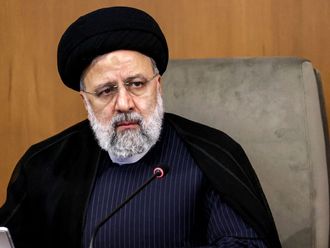
Ramallah: The Palestinian Ministry of Detainees’ Affairs will no longer pay fines imposed by Israeli military courts on Palestinian prisoners effective from June 1, nor will it reimburse families who would have paid the court’s fines, a senior official said.
According to Jawad Al Amawi, who heads the Legal Affairs at the ministry, the fines imposed on Palestinian prisoners and the deals usually stuck with the Israeli Public Prosecution are meant to finance the Israeli military courts.
“The fines imposed on the prisoners are [part of] an Israeli blackmail [exercise] to allocate financial resources to pay the expenses of the courts, where the Palestinian prisoners allocate the budget of the military courts of their jailers,” he told Gulf News. “This will stop shortly.”
“The Israeli military courts collect 50 million shekels (Dh50.54 million) annually from the Palestinian detainees and prisoners and have ended up financially self sufficient institutions that do not stand in need of any Israeli finance,” he said.
Palestinian authorities have noticed that imposing fines on the security prisoners and detainees had become an Israeli trend.
“Deals are being struck with the military prosecution and judges where [sentences] handed [down on] Palestinian prisoners are usually reduced by one to three months in return for fines which the ministry covers,” he said.
The known financial equation here is that a month’s imprisonment is usually bought and bargained by the Israeli military prosecution from 1,000-2,000 shekels depending on the charges pressed against the prisoner.
“When a prisoner is handed an imprisonment which lasts for years, what is the use of dropping a month of two of this sentence?” asked Al Amawi, adding such a deal is meant only to collect money from the prisoners.
The official stressed that the ministry’s plans not to pay the fine were motivated by a desire to ensure the welfare of the prisoner, who, however, may spend a month or two more in Israeli detention. He said instead of paying the money to Israeli military courts, the prisoner would instead get a monthly salary.
“We have urged the families of the prisoners to suspend payment of fines to Israeli military courts and have already told the Israeli Prison Service that no more fines will be settled by the ministry,” he said.
“Requests by families of prisoners, who pay court fines and approach the ministry seeking reimbursement, will be turned down. This is a final decision that will be put in place shortly,” he said.
Al Amawi said that all the ministry’s lawyers and those of the Palestinian Prisoner Club have already been instructed in writing not to participate in any deals which include fines.
“From now on we seek prison terms that are fully away from the fines, which will not be settled under any circumstances,” he said.
He stressed that this issue had been discussed with all the Palestinian factions and political parties who unanimously agreed to the decision and plan of the Palestinian Ministry of Detainees’ Affairs.










